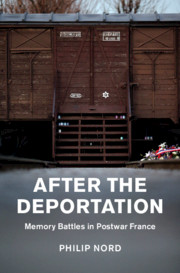Book contents
- After the Deportation
- Studies in the Social and Cultural History of Modern Warfare
- After the Deportation
- Copyright page
- Dedication
- Contents
- Figures
- Acknowledgments
- Abbreviations
- Introduction
- Part I Heroes and Martyrs
- Part II Shoah
- 7 Holocaust
- 8 The Teaching of Contempt
- 9 Witnesses
- 10 Generation
- 11 “The Return of the Repressed”
- 12 Shoah
- Epilogue and Conclusion
- Notes
- Index
9 - Witnesses
from Part II - Shoah
Published online by Cambridge University Press: 16 November 2020
- After the Deportation
- Studies in the Social and Cultural History of Modern Warfare
- After the Deportation
- Copyright page
- Dedication
- Contents
- Figures
- Acknowledgments
- Abbreviations
- Introduction
- Part I Heroes and Martyrs
- Part II Shoah
- 7 Holocaust
- 8 The Teaching of Contempt
- 9 Witnesses
- 10 Generation
- 11 “The Return of the Repressed”
- 12 Shoah
- Epilogue and Conclusion
- Notes
- Index
Summary
The Eichmann trial is oftentimes cited as a turning point in the emergence of Holocaust consciousness in France. That’s not wrong, but it misses other ways in which the early 1960s were important in shaping a new narrative about the genocide, one more centered on Jewish experience and pain. Schwarz-Bart’s literary breakthrough opened the path for others, for writers and documentarists like Piotr Rawicz, Anna Langfus, and Frédéric Rossif. All three were Jews who had, like Langfus and Rossif, lost family members to the Holocaust or who had spent time in a concentration camp as had Rawicz. The first two wrote novels which drew on their life experiences: Le Sang du ciel in Rawicz’ case (1961), which won the Prix Veillon, and Les Bagages du sable (1962) in Langfus’, which won the Prix Goncourt. Rossif made a documentary about Warsaw Ghetto survivors, Le Temps du ghetto (1961), which was shown first in Paris theaters and then on French TV in 1964. The stories they had to tell were not ones of martyrdom or heroism but ones of fear, irretrievable loss, and abandonment. This Deportation admitted neither of heroics nor of redemption. It was a story without a happy ending.
- Type
- Chapter
- Information
- After the DeportationMemory Battles in Postwar France, pp. 287 - 307Publisher: Cambridge University PressPrint publication year: 2020

